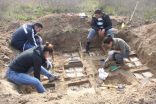(Press-News.org) FORT LAUDERDALE-DAVIE, Fla. - Tigers - they are some of nature's most beautiful, deadly and endangered species. In fact, living tigers are severely endangered in fragmented geographic areas across Asia - some reports show their numbers as low as 3,000 wild individuals. While there are efforts to help protect these magnificent creatures, more was needed in terms of research into the genetics of tigers.
Nova Southeastern University researcher Stephen O'Brien was part of a team of research scientists from China, the United Kingdom, Israel, Russia and Qatar that looked at the genetic make-up of tigers. Their 10-year study, which is published online in the Journal of Heredity and will appear in the print edition May 1, 2015 describes DNA signatures for 145 individual tigers, including "voucher specimens" of tigers from verified geographic origins including Eurasian museum specimens that represented extinct subspecies.
Their study's first results appeared in 2004 that showed Malayan tigers splitting from its Indochinese counterpart as a distinct, new fifth-living tiger subspecies. The latest results show that extinct Javan (1980s) and Bali (1940s) tigers were nearly indistinguishable from a molecular standpoint from Sumatran tigers just as the extinct Caspian tigers are nearly identical to surviving Amur tiger subspecies.
"These results are important to help craft management strategies for protecting each surviving subspecies of tiger and stabilizing the march toward extinction that they are clearly on," O'Brien said. "These markers also provide powerful tools for forensic identification of subspecies in captive populations as well as trafficked bones and skins in illegal trade enforcement."
O'Brien likened the new tiger DNA findings to how DNA testing changed the way human courts gather evidence to prosecute cases. The same approach can be applied to tigers as a new, more powerful tool for wildlife protection and, hopefully, reducing illegal wildlife commerce.
Prior to his role with NSU, O'Brien served as Chief of the Laboratory of Genomic Diversity at the National Cancer Institute (NCI,) National Institutes of Health (NIH.) for 25 years. In 2011 he joined the Theodosius Dobzhansky Center for Genome Bioinformatics, St. Petersburg State University (Russia) as its Chief Scientific Officer. He also serves as Director of Research for NSU's Office of Research and Technology Transfer.
O'Brien is well known for his research contributions in comparative genomics, virology, genetic epidemiology, mammalian systematics and species conservation. In 1983, he and his collaborators discovered the remarkable genetic uniformity of the African cheetah, a prelude to a new discipline of Conservation Genetics. In addition, the past four years, O'Brien has been part of an international consortium of scientists working to detail the genome sequence of 48 different birds. This group of researchers - who call themselves the Avian Phylogenomics Group - is made up of 200 scientists from 80 institutions in 20 countries. This group is an "outgrowth" of the Genome 10K Project (G10K,) which was co-founded in 2009 and led by O'Brien.
With more than three decades of field studies with his students and colleagues, O'Brien subsequently reported in approximately 300 publications, many in the highest rated scientific journals of how genetics could inform and facilitate management action for endangered species. These included identifying new species of elephant, clouded leopard and orangutan plus detailed genetics studies on threatened wildlife species including cheetahs, lions, giant panda, leopards, pumas, jaguars, koalas, humpback whales, the Florida panther and, of course, tigers.
INFORMATION:
About Nova Southeastern University (NSU): Located in beautiful Fort Lauderdale, Florida, NSU is a dynamic research institution dedicated to providing high-quality educational programs at the undergraduate, graduate and first-professional degrees levels. An independent, not-for-profit institution with approximately 25,000 students, NSU has campuses in Fort Lauderdale, Fort Myers, Jacksonville, Miami, Miramar, Orlando, Palm Beach and Tampa, Florida as well as San Juan, Puerto Rico and online globally. For more than 50 years, NSU has been awarding degrees in a wide range of fields, while fostering groundbreaking research and an impactful commitment to community. Classified as a research university with "high research activity" by the Carnegie Foundation for the Advancement of Teaching, NSU is one of only 37 universities nationwide to also be awarded Carnegie's Community Engagement Classification. For more information, please visit http://www.nova.edu
A new study in Marketing Science, a journal of the Institute for Operations Research and the Management Sciences (INFORMS), finds that most firms do not use the skimming or penetration strategies that deliberately overprice or underprice new products.
Skimming or Penetration? Strategic Dynamic Pricing for New Products appears in the Articles in Advance Section of Marketing Science. The research was conducted by Martin Spann, Ludwig-Maximilians-University Munich; Marc Fischer, University of Cologne and University of Technology, Sydney; and Gerard J. Tellis, Marshall School ...
Measuring the concentration of leukemia cells in patient bone marrow during the first 46 days of chemotherapy should help boost survival of young leukemia patients by better matching patients with the right intensity of chemotherapy. St. Jude Children's Research Hospital investigators led the research, which appears in the March 20 edition of the journal Lancet Oncology.
The findings stem from a study of 498 children and adolescents with acute lymphoblastic leukemia (ALL) enrolled in a St. Jude-led protocol between 2000 and 2007. The clinical trial was the first to use ...
MANHATTAN, Kansas -- Kansas State University scientists have released findings of a complex, two-year study of the genomic diversity of wheat that creates an important foundation for future improvements in wheat around the world.
Their work has produced the first haplotype map of wheat that provides detailed description of genetic differences in a worldwide sample of wheat lines. In genetics, a haplotype map is a powerful tool for transferring sequence-level variation to multiple gene mapping projects.
"All of these new, genomic-based strategies of breeding promise ...
EAST LANSING, Mich. - Recycling plastic works; additives to biodegrade plastic do not.
A new study from Michigan State University shows that several additives that claim to break down polyethylene (i.e., plastic bags) and polyethylene terephthalate (i.e., soda bottles) simply don't work in common disposal situations such as landfills or composting.
"Making improper or unsubstantiated claims can produce consumer backlash, fill the environment with unwanted polymer debris and expose companies to legal penalties," said Susan Selke, co-author of the study and MSU packaging ...
The March 2015 issue of Language, the flagship scholarly journal of the Linguistic Society of America, is now available online:
https://muse.jhu.edu/journals/language/toc/lan.91.1.html
Highlights of the March issue include a paper on the origins of Indo-European languages which has already been the subject of significant interest, as well as the inaugural article of Language's new online section for "Phonological Analysis".
"Ancestry-constrained phylogenetic analysis supports the Indo-European steppe hypothesis", by Will Chang, Chundra Cathcart, David Hall and Andrew ...
A plant scientist from The Australian National University (ANU) has called for the United Nations to guarantee free and open access to plant DNA sequences to enable scientists to continue work to sustainably intensify world food production.
Dr Norman Warthmann, a plant geneticist at the ANU Research School of Biology, has lodged a submission with the UN, which is currently considering issues to include in its 2015 Global Sustainable Development Report.
Food security depends on an acceleration in plant breeding, which could be threatened by private companies restricting ...
The first blood test for osteoarthritis could soon be developed, thanks to research by the University of Warwick.
The research findings could potentially lead to patients being tested for osteoarthritis and diagnosed several years before the onset of physical symptoms.
Conducted by the University's Medical School, the research identified a biomarker linked to both rheumatoid and osteoarthritis.
Whilst there are established tests for rheumatoid arthritis (RA), the newly identified biomarker could lead to one which can diagnose both rheumatoid arthritis and osteoarthritis ...
Sipuleucel-T (trade name Provenge) has been approved since September 2014 for men with metastatic prostate cancer who have few or no symptoms and do not yet require chemotherapy. In the dossier assessment conducted by the German Institute for Quality and Efficiency in Health Care (IQWiG) in January 2015, no added benefit could be derived for sipuleucel-T.
In an addendum, the Institute now examined information subsequently submitted by the manufacturer in the commenting procedure: According to the findings, there is an indication of added benefit; however, the extent is ...
Adapting to climate change could have profound environmental repercussions, according to a new study from the University of East Anglia.
Research in Nature Climate Change reveals that adaptation measures have the potential to generate further pressures and threats for both local and global ecosystems.
Lead researcher Dr Carlo Fezzi, from UEA's School of Environmental Sciences, said: "Climate change is a just a little bit more complicated than we previously thought. We need to take into account not only the direct impact of climate change, but also how people will respond ...
Scientists should reduce antibiotic use in lab experiments - according to a researcher at the University of East Anglia.
Microbiology, molecular biology and genetic research such as the Human Genome Project use antibiotics in experiments.
But it all adds to the global problem of antibiotic resistance according to Dr Laura Bowater, from UEA's Norwich Medical School.
A new article published today in the Journal of Antimicrobial Chemotherapy highlights the problem.
Dr Bowater said: "The discovery of antibiotics was heralded as a magic bullet for modern medicine. Using ...


